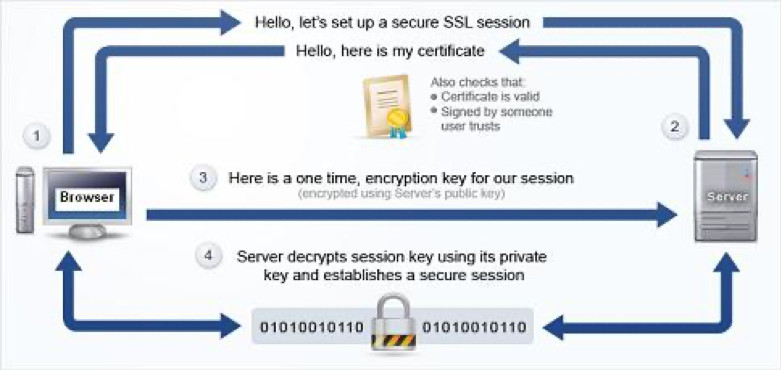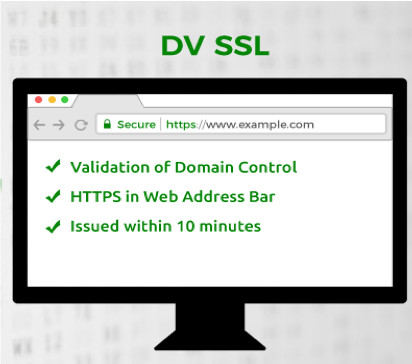How SSL Certificate Validation Works
August 13, 2020
Blog

SSLs are digital certificates that use encryption security for the protection of information. Their existence provide authentication to the sites, confidentiality of transactions, & integrity of data.

As the entire world moves from offline to online, internet security is becoming a necessity and a priority. To ensure customer information or any other data transmission between website and web-browser is safe and secured, Secure Socket Layers (SSL) certificates are installed on sites.
What is SSL?
SSLs are digital certificates that use encryption security for the protection of information. Their existence provide authentication to the sites, confidentiality of transactions, and integrity of data.
For e-commerce industries, an SSL certificate is compulsory as per PCI DSS (Payment Card Industry Data Security Standard) for securing financial transactions.
How does SSL Certificate work?
SSL encryption security works on asymmetric encryption, which is also called public-key cryptography/encryption.
Asymmetric encryption works on two cryptographic keys, i.e., the public key and the private key. The public key is used for encryption of data, and the private key is used for decryption of data. This compact form of communication gives the customers assurance about the safety of their transactions and helps increase trust.
Process
- The browser attempts to connect itself to a website/web server secured with an SSL certificate.
- The web server sends a copy of the SSL certificate to the browser.
- The browser checks the authenticity of the certificate and sends a message to the webserver.
- In return, the webserver/website sends a digitally signed acceptance for initiating an SSL encrypted session.
Thus, encrypted communication is started between browser and web server.

Types of SSL Validations (DV, OV & EV):
Validation itself is a scary word. The certificate authorities (CA) need to ensure that your business is legitimate, and hence, they validate your business authenticity before issuance of SSL certificate for your website.
Verification of information depends on the type of SSL certificate selected by the business owner. In DV, only the registration of Domain name is validated, while OV and EV require verification of company.
SSL certificates are available in three types of Validations. They are:
- Domain Validation (DV)
- Organization Validation (OV)
- Extended Validation (EV)
Domain Validation (DV) SSL:
This is the most basic type of SSL validation and can be completed in one step. The CA verifies and ensures that the client who has applied for the certificate is the owner of a registered domain.
The client applying for the SSL certificate needs to prove via email authentication, that they own the domain name. The CA will verify from the WHOIS registrar email address to confirm whether the client has registered themselves for an SSL certificate or not.

In case of an affirmative reply, the DV SSL certificate is issued by the CA to the client/business owner
It can be issued quickly, and once it is installed on the website, it shows HTTPS in the address bar and a padlock in the URL. This is the best option for small businesses and individuals owning single sites.
(There are other alternative methods to fulfill the DV SSL requirement. For further information, click here.)
Issuance of a DV certificate from CA is an automated process, and hence it saves cost and time.
The only disadvantage is that these certificates are validated at the domain level and not at an organizational level.
The main motto of clients opting for DV SSL is a secured session and boost in SEO rankings.
Examples: Comodo Positive SSL, RapidSSL certificate, Thawte SSL123, etc. and many more DV SSL certificates are available at SSL2BUY.
Organization Validation (OV)

As the name suggests, CA validates the organization before issuing an OV SSL. They are the best for medium businesses where a click on the padlock indicates their company name.
OV certificates display the domain name, name of the company, name of the city, state, and country where the company exists.
OV Requirements
- Authentication of Organisation
- Local Presence
- Telephone Verification
- Domain Verification
- Verification Call
This process helps distinguish fake companies from genuine ones. Sites with OV SSL are trusted differently. Its issuance time is one to three business days since the business verification takes some more time.
Examples: Comodo Instant SSL Pro, GeoTrust True BusinessID SSL, GlobalSign Organisation SSL Certificate, and many more are available at SSL2BUY.
Extended Validation (EV SSL)
EV certificates display trust at the topmost level, thus, large enterprises and corporations usually prefer EV SSL. The rigorous CA validation process before issuance of an EV SSL instantly connects the users with the trust factor.
EV SSL is almost at the same cost of OV SSL, but it distinguishes phishing sites, prevents phishing attacks, and inspires site visitors by displaying trust and confidence to approach the site.

Here too, the company name and location are visible in certificate details. Since these certificates imbibe trust, they help increase conversions and ROI.
(To know more about EV SSL, click here.)
Since extensive business verification is required, the issuance time of EV SSL is one to three business days. Apart from the EV SSL agreement form, other documents mentioned below are required.
- Lawyer’s letter
- Business Authentication (address, date of registration)
- Domain Authentication
- EV SSL CA Approver’s Authentication
- Telephonic Verification
- Other Documents
Examples: Comodo EV MultiDomain SSL certificate, GlobalSign EV SSL, GeoTrust TBID EV SSL (single domain), etc. and many more are available at SSL2BUY.
Conclusion
Customers get a comfortable feeling when they see SSL encryption security on a site. Its trust icons, i.e., Https in the address bar and padlock in the URL, ease their mind for doing business on such websites.
Getting the right type of SSL validation is essential since your site and business security depends on it.
If you have a single site and small business, you may opt for DV SSL, but if you own an e-commerce store or are into the finance business, wherein a lot of financial transactions are involved, EV SSL is the ideal choice.
Many cheap SSL certificate providers are providing all the above types of SSL certificates at discounted rates. SSL2BUY is one such stop that fulfills all your business needs. Buy a cheap SSL certificate from SSL2BUY and secure your site instantly.
About the Author
Dan Radak is a web hosting security professional with ten years of experience. He is currently working with a number of companies in the field of online security, closely collaborating with e-commerce companies.




